2023 | Perspektive Deutsches Kino
Between Fervour and Self-Determination
In her first edition as section head of Perspektive Deutsches Kino, Jenni Zylka speaks about the diversity of cinematic forms in this year's selection: from haunting documentaries based on original source material to a condensed musical, all the way to cleverly conceived relationship dramas. Taken as a whole, they are united by the desire to examine the global in the individual.
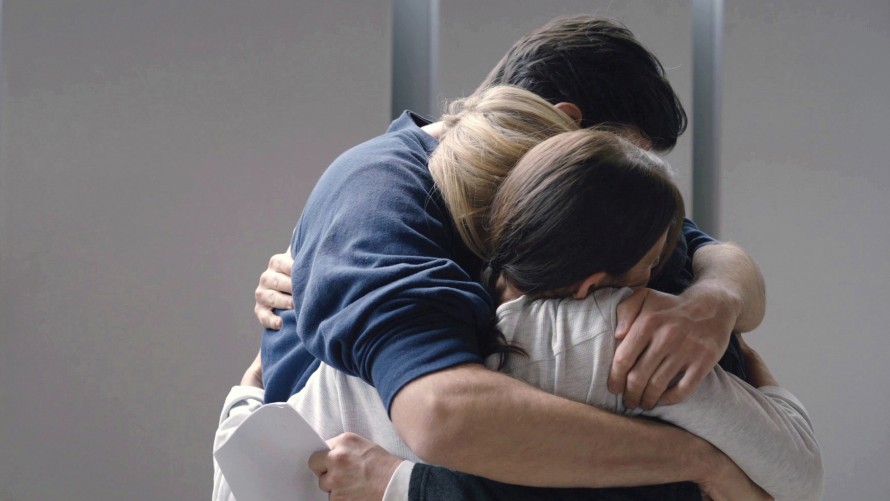
Knochen und Namen by Fabian Stumm
Jenni, this edition is your first as director of Perspektive Deutsches Kino, though it isn't your first Berlinale by a long shot – to what extent have you been able to transfer your experience from working at Panorama, for instance, to this new position?
A passion for cinema is essentially the basis for both jobs, of course, for the old one, as a pre-screener and moderator, and for the new one as section head. Though it's true that I now cover a different group of works, namely German debut and second films, the selection process is still all about falling in love with a film, with a character, a subject, an idea, a realisation, it's about analysing why I'm in love, finding criteria to evaluate this state of affairs. Aside from that, in my first permanent position I've been learning important things such as team management, organisational stuff, like how to use shared office tools and label yoghurt containers and Crémant bottles with my initials for the shared refrigerator. The last point is the most important, of course.
Regarding the orientation of the Perspektive, what sort of ideas and wishes do you have for the future development of the section?
I would love to expand it, in every regard – especially when it comes to the significance of German cinema abroad. There is no reason why German films from up-and-coming directors shouldn't head out into the world and gain the attention of a global audience. The Perspektive has worked for that from the beginning. Films are good when they have a universal message, when they tell a universal story – where they come from is actually of marginal importance. And it goes without saying that stories produced in Germany are just as urgent, emotional and universal as any others.
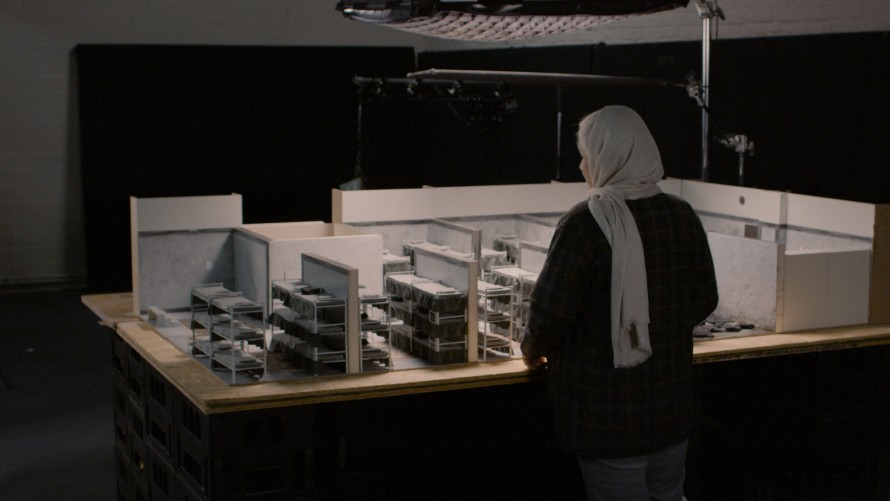
Sieben Winter in Teheran by Steffi Niederzoll
The opening film Sieben Winter in Teheran (Seven Winters in Tehran) by Steffi Niederzoll recounts a legal scandal in Iran that cost a young woman her life – how does the film manage to convey the devastating extent of a patriarchal system's misogynistic legislation with such intensity? And how does Sieben Winter in Teheran provide commentary on the current events of the revolution in Iran?
It is clear where the focus lies, indeed must lie, with this unfathomable and shocking story: on the protagonist Reyhaneh Jabbari, on her family and on depicting the injustice inherent in this system. Debut director Steffi Niederzoll has created an impressively reserved film that lets the facts speak for themselves, a film which is incredibly touching for precisely that reason. In addition, her material is really unusual – lots of original images, original voices, and on top of that she was able to establish a close and warm relationship with the surviving family members. That makes it even more authentic and intimate. Everything about the film is just right. Of course, it is awful how timely and relevant the film remains – it shows once again how women's rights (and thus simply human rights) are being ignored in this country, and how necessary it is to protest against this, nationally and internationally. So that something finally changes, and stories like Reyhaneh's never happen again.

Ararat by Engin Kundağ
A considerable number of works in the program feature protagonists whose desire for (sexual) self-determination stands in sharp contrast to societal and familial expectations. I am thinking here, for instance, of Elaha by Milena Aboyan, Ararat by Engin Kundağ, Geranien (On Mothers and Daughters) by Tanja Egen and El secuestro de la novia (The Kidnapping of the Bride) by Sophia Mocorrea. How do these films relate to one another, how do they complement or comment on each other, especially in regards to the above-mentioned aspect?
Yes, this aspect is in fact present in all of these films – and yet they are extremely diverse, since the initial situations are so different. German-Kurdish Elaha has to find out for herself what role restrictive cultural expectations – in this case, having to do with the reconstruction of her hymen – play for her. In Ararat, the conflict is much more unspoken, mysterious – the viewer can only guess what the very guarded but also extremely interesting protagonist may have suffered. Geranien treats the very wise and lovely realisation (in my opinion) that one's own parents are also someone's children. And Sophia Mocorrea relates in a wonderfully free way how dumb traditions can be and the sort of misconceptions that lie within them. So, we have manifold conflicts here – as diverse as life itself.
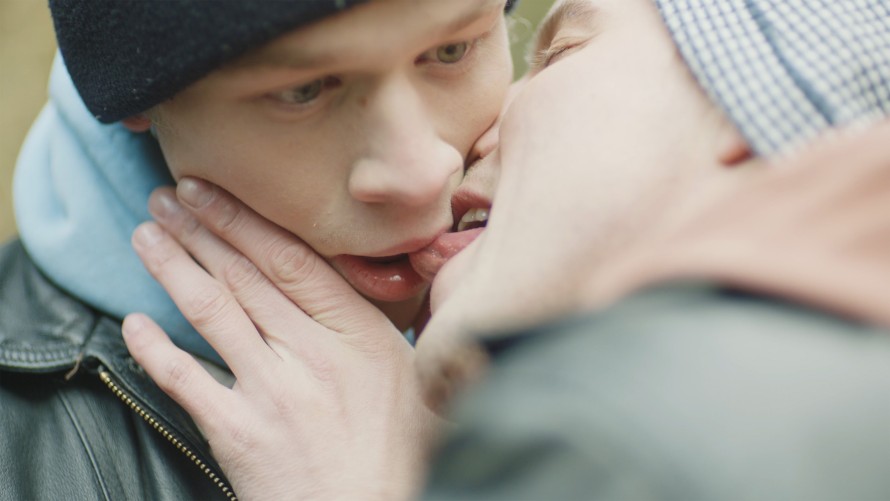
Niels Thalmann and Christian Erdt in Langer Langer Kuss by Lukas Röder
Knochen und Namen (Bones and Names) by Fabian Stumm and Langer Langer Kuss (Long Long Kiss) by Lukas Röder both approach relationships that have come to a conclusion in very unique yet different ways. What perspectives do these films adopt in exploring these at times painful reflections?
Knochen und Namen is about a romantic relationship that has already been stagnating for a while – Boris and Jonathan negotiate questions of intimacy and distance, typical conflicts that everyone is familiar with from their own experience. The whole thing is presented in an extraordinarily clever and entertaining way, in tableau-like scenes featuring a host of philosophical musings on the side playing on the difference between reality and cinema. Langer Langer Kuss, on the other hand, depicts a relationship between siblings: Aaron's sister is really worried about him because he hasn't brushed his teeth since the break-up with his boyfriend. In spite of its medium length, the film really pulls the viewer in deep, there is something very thrilling and unsettling about it. Even just the idea that someone doesn't brush their teeth really starts to get under your skin in a weird way.
With its seductive imagery, Nomades du nucleaire (Nuclear Nomads) by Kilian Armando Friedrich depicts more than just the individual destinies of so-called nuclear nomads – it also manages to connect the dots and expose precarious working conditions on society's margins. What does the film accomplish, particularly in an age in which our crisis-plagued energy supply dominates the news?
This is a very haunting film. We witness people risking their physical well-being in order to have a future – and in doing so they are perhaps keeping this very future from becoming a reality… Alongside the individual stories, which are all incidentally based exclusively on close and careful observation of the involved parties, that is, in classic "fly-on-the-wall" style, the film makes one painfully aware once again, long after leaving the cinema, how dangerous nuclear power plants are in every respect. At the same time, however, this work is also a truly harrowing portrait of a very particular work world. The "nomadic", which has recently enjoyed a positive connotation through the hip conception of the nonchalant globetrotting "working nomad" (justifiably offset by excellent films such as Nomadland), is shown from a grim angle in this film: just the way the mobile home sits parked in front of the steaming nuclear reactor, surrounded by happily playing children, really gets to you.
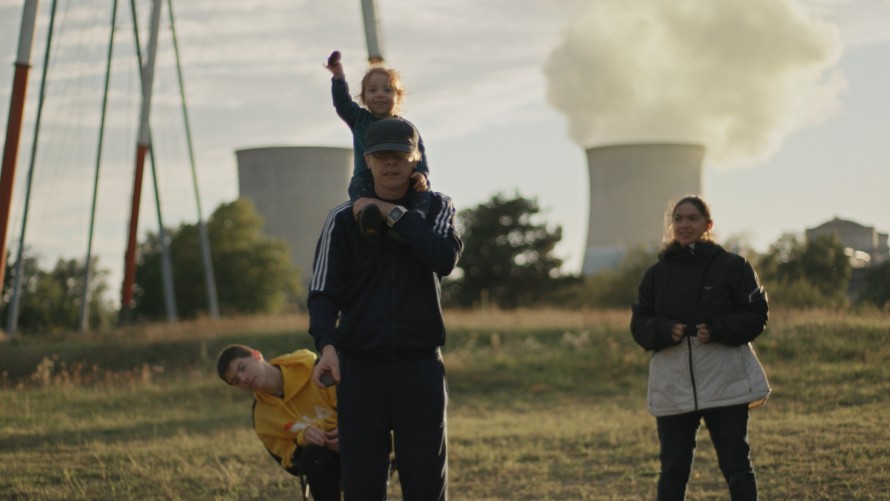
Nomades du nucleaire (Nuclear Nomads) by Kilian Armando Friedrich
The powerful and disturbing documentary Vergiss Meyn Nicht (Lonely Oaks) by Fabiana Fragale, Kilian Kuhlendahl and Jens Mühlhoff also gets very close to its protagonist, film student Steffen Meyn, if for no other reason than the material employed here: for two years, Meyn filmed the occupation of the Hambach Forest with a 360°helmet camera, until he was fatally injured during the police-led removal of the protestors. The film now takes up this material and expands on it through interviews with activists. Among other things, the film resonates in an equally timely and bitter way in light of the latest developments in the town of Lützerath, which was occupied by climate activists until very recently…
Yes, that is why I was – and still am – really so haunted by it too. Not only by the fact that the moment of Steffen Meyn's death was effectively captured on film – naturally, the filmmakers are respectful and clever enough not to show this – but by the fact that all of the material is in the true sense of the word of dizzyingly high quality from multiple points of view. We move around 30 metres up in the air almost the entire time, meaning we're in danger – and we experience how individuals assume this risk by putting their lives on the line for the protection of nature. That is crystal clear to those depicted in the film, the activists contacted by Steffen Meyn and subsequently interviewed again by the filmmakers – they reflect on their role and intentions after the whole action, filled with doubt and self-criticism, although they are of course still firm in their conviction that the goal behind their actions was correct. That is why Vergiss Meyn Nicht is an extremely timely film: what could be more relevant than the question of how far activism must go or is allowed to go? In connection with "Lützi" or also the actions of the "Last Generation", these are precisely the issues that our society is enormously concerned with at the moment. In the end, of course it is always all about improving our world together and finding ways to live more sustainably.
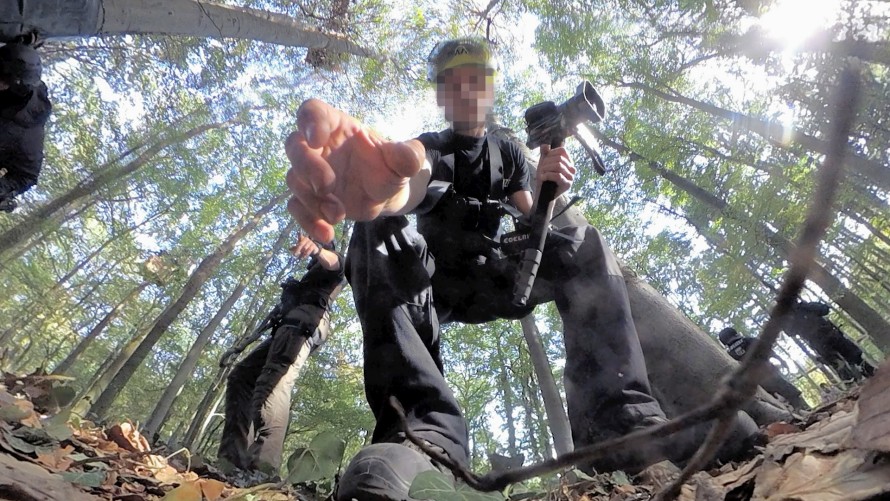
Vergiss Meyn Nicht by Fabiana Fragale, Kilian Kuhlendahl and Jens Mühlhoff
The questions about police violence and inherent structural racism raised in Vergiss Meyn Nicht are also addressed in a special way by Bárbara Santos and João Pedro Prado in Ash Wednesday, specifically in the form of a short musical. Wherein lies the particular strength of this very special form combining raw violence with music?
What I find convincing about the film is how well the rhythms and instrumentation fit the subject matter: when the police officer spits out his contemptuous "favelado!" (which means roughly "slum dog", and is therefore an insult) to the sound of these Brazilian drums, it expresses something about power relations and racism on multiple levels. He can afford to insult the people in the favela, to punish them arbitrarily, to shoot at them. Incidentally, the entire favela was reconstructed in the studio at HFF Potsdam – unbelievable! It looks astonishingly real, and the film has a very immersive effect in spite of its medium length.
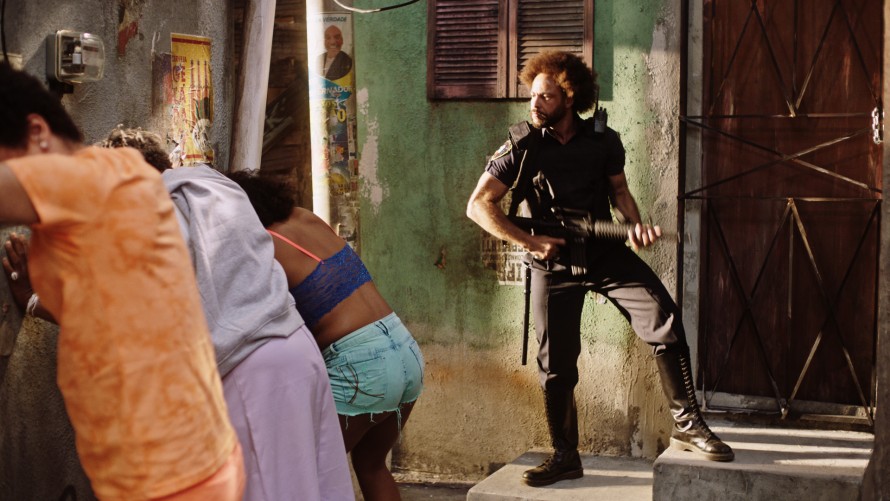
Ash Wednesday by Bárbara Santos and João Pedro Prado
Beyond these points, do you see further thematic or stylistic motifs manifesting themselves in the selection for this year's edition?
For me, this year is quite characterised by reflections on sustainability and self-determination – as it should be too! Of course, film always mirrors society as well. On the whole, global themes appear to be taking the place of the search for one's own personal demons a tiny bit. From a stylistic viewpoint, I see – as always – a broad spectrum, and it is really fun to witness it.
New this year is the introduction of the Perspektive Match format. Can you describe that for us briefly? How did you go about making the film selection for this supplemental series?
This is a great format – Linda Söffker intended to launch it already last year, but wasn't able to realise it due to the pandemic. So I am that much happier now that we are able to implement it in a slightly altered form: we want to empower the film trades, to draw attention to the fact that a film is a collective artwork. For this reason, we are bringing crew members from four films in the program who occupy various roles – music, editing, sound, acting – together with experienced colleagues from the German Film Academy. Editor Hansjörg Weissbrich, actress Jenny Schily, sound designer Frank Kruse and film composer Ali N. Askin have all committed to supporting this project. On four afternoons, we will screen a film featuring the work of one respective DFA colleague, followed by a dialogue between the newcomer and the veteran. We collaborated on the film selection with the DFA colleagues – they are intended to be films in which their respective crafts play a special role: Requiem by Hans-Christian Schmid features unique, sensitive editing; among its other strengths, Ein Hologramm für den König (A Hologram for the King) by Tom Tykwer has really extraordinary sound design; the soundtrack from Ali Soozandeh's Teheran Tabu (Tehran Taboo) is impressively versatile; and Jenny Schily performs with such abandon in Stina Werenfels' Dora oder die sexuellen Neurosen unserer Eltern (Dora or the Sexual Neuroses of Our Parents) that it is a pure pleasure to behold.
Are there other events featuring discourse, aside from Perspektive Match?
Yes! "Talking about Film" will take place again, in a new location this time: at Manifesto Market in The Playce (the former Potsdamer Platz Arkaden), I will be meeting with experts from the industry on two occasions. On the first Sunday, I'll be speaking with an actress and a casting agent about casting and the many questions that the process evokes – how do you figure out who fits a part, what is typecasting and so on. And on Saturday, I'll be talking about music and music rights in film, with a music supervisor and a film music composer. Music, or scoring, is, of course, an enormously important craft within cinema, it has an immediate emotional effect – and yet sometimes we are hardly even conscious of it. On the other side, there is the soundtrack, which, in contrast to the score, consists of music that already existed – and that is also an extremely complex matter, since it obviously costs money to use other people's music. And choosing the right music is just as important as composing the right music.
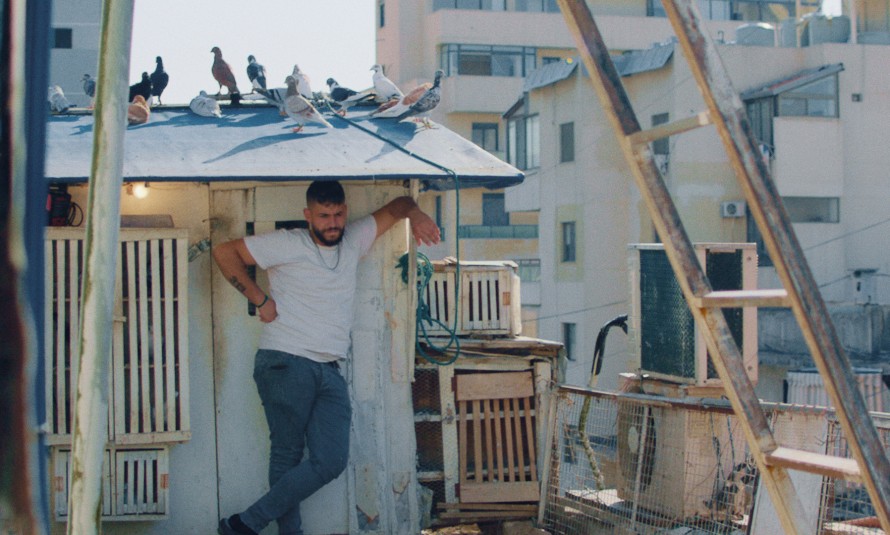
Kash Kash by Lea Najjar
Once again, there are also two guest films at the Perspektive – could you tell us something about Kash Kash by Lea Najjar in particular?
Sure. One of the films will be screened in the scope of our co-operation with the DEFA Stiftung; that is a wonderful, freshly restored version of Jakob der Lügner (Jacob the Liar), Frank Beyer's very touching Jurek Becker adaptation from 1974, featuring Vlastimil Brodský and a young Henry Hübchen. And Kash Kash, our First Steps guest, meaning the winner of last year's First Steps Award, is an unusual documentary film: a portrait of pigeon gamblers, individuals who raise pigeons on the rooftops of Beirut and send them into the sky to participate in a game of chance – whoever gets the most of the other players' pigeons to land on their roof wins. A highly poetic film, both thematically and in terms of imagery – we see a lot from the pigeon's-eye view, effectively gliding through the Beirut sky on the birds' wings, while hard realities such as the port explosion, anti-government protests and social injustices play out down below.
Can you say something in conclusion about this year's Perspektive jury?
I'd be glad to – I was so delighted by Jöns Jönsson's enigmatic film Axiom in the Encounters section last year that I immediately invited him to be part of this year's jury! The actress Dela Dabulamanzi has been on my radar for a long time – she exhibits a unique sly humour in her roles, but can also switch things up at lightning speed. And I am simply a big fan of editor Anne Fabini's work, she is brilliant at her craft and a very wise conversation partner on the topic of cinema. I am eager to see what the three of them think of our films, and which one they will select as the winner. And I am happy that I don't have to do their job – I definitely wouldn't be able to choose!